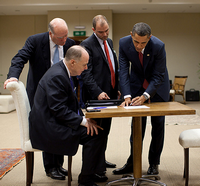The U.S.-led military intervention in Libya is decidedly different than the ongoing military operations underway in Iraq and Afghanistan in at least one sense: Unlike those wars, which President Barack Obama inherited from his predecessor, Libya is Obama's war from start to finish. As such, it offers us the first true picture of how this commander-in-chief commands -- and how he believes U.S. force should be employed.
One thing we have learned is that the president is very much a reluctant warrior, as was evident even before he launched what his press secretary calls a "time-limited, scope-limited" operation. Consider the president's statement on Libya in early March, when he noted that his administration had "organized . . . a series of conversations about a wide range of options that we can take." To be sure, there are benefits to husbanding U.S. military power, especially given U.S. force commitments in Afghanistan and Iraq, as well as in South Korea, Japan and the Asia-Pacific region. But there are also risks, especially in an era when so much of the world tacitly or openly depends on Washington to keep the peace or at least keep the bad guys at bay.
More troubling than Obama's initial reluctance has been the administration's lack of clarity when it comes to Gadhafi's future. Before the allied bombs started falling, the president said he was in "consultation with the international community to try to achieve the goal of Mr. Gadhafi being removed from power." Although the president has since called for Gadhafi to step down, he was noticeably silent on the issue during his speech announcing the start of the war. Moreover, his surrogates and military team have muddied the waters. The goal of Odyssey Dawn, according to Sen. John Kerry, one of the president's allies in Congress, "is not to get rid of Gadhafi" because "that's not what the United Nations licensed." White House adviser Ben Rhodes added, "The effort of our military operation is not regime change." Adm. Mike Mullen, chairman of the Joint Chiefs, conceded that a military stalemate resulting in Gadhaf staying in power is "a possibility." Yet, according to Secretary of State Hillary Clinton, the "final result of any negotiations would have to be the decision by Col. Gadhafi to leave."

